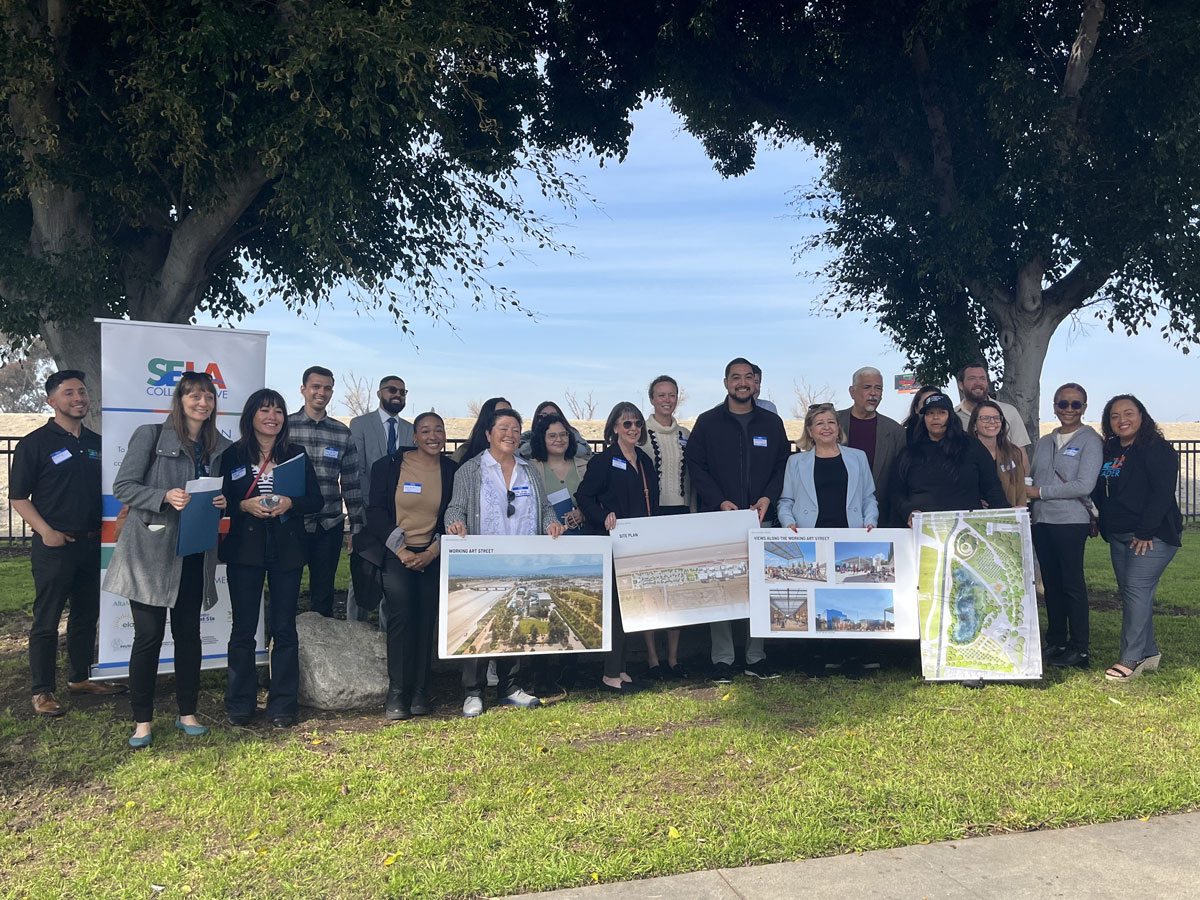RCC Year 1: Annual Report: Gateway Cities Regional Climate Collaborative (GCRCC)

Overview
Award Amount: $1,750,000
Region: Los Angeles County
Communities of Focus: Bell, Bell Gardens, Cudahy, Huntington Park, Lynwood, Maywood, South Gate, Vernon, Florence/Firestone, and Walnut Park
Partners:
The GCRCC strengthens and formalizes cross-sectoral relationships that collectively leverage skills, knowledge, practices and networks to ensure community-driven action to combat climate change. The GCRCC uplifts the voices and climate needs of the communities in Southeast Los Angeles through engagement that invites residents, community, and elected leaders to participate in and lead the process.
About the Collaborative
The Gateway Cities Regional Climate Collaborative (GCRCC) strengthens and formalizes the relationships between five community partners that have worked together in the Southeast Los Angeles (SELA) region for more than five years to leverage skills, knowledge, and networks to ensure community-driven action to combat climate change in SELA communities. Residents in the SELA region are primarily low-income communities of color who experience extreme heat, limited park space, low tree canopy coverage, and high levels of pollutants due to the movement of goods from the Ports of Los Angeles and Long Beach. The GCRCC aims to address these issues by increasing access to new and existing resources through a process that prioritizes community engagement, engaging in data collection to identify regional climate needs, and developing publicly available reports that benefit under-resourced communities to expand the capacity of the SELA region.
Highlights in Year 1
GCRCC is committed to addressing a variety of climate issues that affect SELA, including extreme heat, a major challenge for the region. According to data from the Los Angeles Chief Sustainability Office, extreme heat is the most significant threat to communities in the area due to factors such as low percentage of tree coverage (12.3% compared to the 17% Los Angeles County-wide average) and a high percentage of impervious surfaces that exacerbate the urban heat island effect (76.3% compared to the 60.1% Los Angeles County-wide average).
This year, the collaborative completed an extreme heat-related data review and compiled existing data from collaborative partners. This data review will be critical to inform GCRCC’s regional community survey about extreme heat that will be shared with stakeholders in the Communities of Focus and a regional Climate Needs Analysis for the SELA region. The analysis will include social and environmental determinants such as housing, employment, education, gender, and age, as well as feedback from the community about extreme heat and climate solutions and perceptions. Such data is important to identify knowledge gaps and where resources need to be invested for better outcomes. This data collection is also a first step in developing a GCRCC roadmap to support local cities in developing climate plans, identifying climate mitigation projects, building regional capacity, and securing federal funding the region for projects related to extreme heat and climate vulnerability.
Members of the collaborative also applied for various state and federal grants to advance community-led projects in this under-invested region. For example, they secured a $14 million CAL FIRE Green Schoolyards Grant which will help schools in the SELA region convert pavement to green spaces and create drought tolerant natural areas on school grounds. They also applied for the U.S. Environmental Protection Agency’s Inflation Reduction Act Community Change Grant which, if awarded, would fund tree planting, solar upgrades, green schoolyards, and water quality testing.
A key focus of the collaborative this year was to build stronger relationships between the partners and establish a meaningful collaborative governance structure. This work is critical to building trust and strong working relationships between partners that can endure far past the Regional Climate Collaboratives (RCC) grant cycle.
To this end, the collaborative organized more than 60 internal meetings, including an all-partner governance retreat to establish a strong foundation for their partnership.
In February of 2024, GCRCC hosted a day-long site visit which featured an overview of the collaborative’s work and a walking tour of the project area that was attended by state and federal legislative staff in the region. This site visit allowed stakeholders to get a deeper understanding of climate impacts, provide input on collaborative plans, and build relationships.
Key Milestones:
- Collaboratively developed a collective vision, purpose, and values, as well as a comprehensive branding and communications plan.
- Secured more than $10.5 million in grants from the Southern California Regional Energy Network, Los Angeles County Regional Park and Open Space District, U.S Forest Service IRA Urban and Community Forestry, and more.
- Applied for 16 state and federal grants including California Energy Commission’s Building Energy Decarbonization Grant, Governor’s Office of Planning and Research’s ICARP Extreme Heat and Community Resilience Program Grants, and Los Angeles County’s Productivity and Investment Fund.
- Hosted a Climate Change 101 and Heat workshop with high school and college students hosted by Charles Drew University researchers. These students will also be supporting with GCRCC’s Regional Community Survey which will inform the Collaborative’s Regional Climate Needs Analysis.
What’s Next
Throughout the next two years, GCRCC will continue to host regular partner meetings, advance their communication strategy, and identify new ways to increase access to resources and expand capacity to address extreme heat and other climate vulnerabilities in the region. In the coming year, GCRCC will develop their GCRCC Roadmap which will include a Community Climate Solutions inventory that lists priority plans and projects that the collaborative is seeking to implement during the grant term. The GCRCC will also provide training to community-based organization staff, city staff, and other stakeholders to increase their knowledge of available resources and increase their capacity to compete for grants.